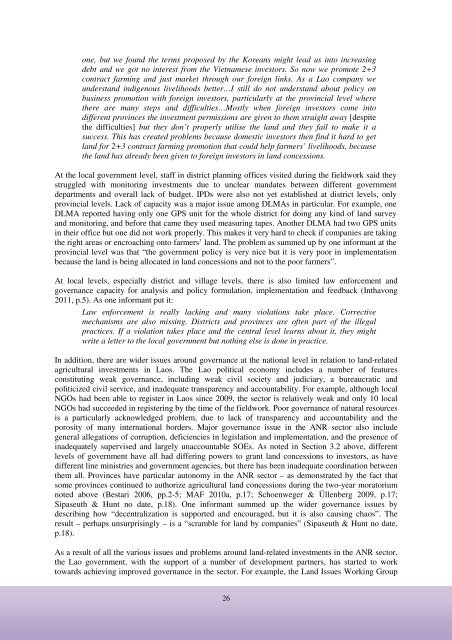6gEvuX
6gEvuX
6gEvuX
You also want an ePaper? Increase the reach of your titles
YUMPU automatically turns print PDFs into web optimized ePapers that Google loves.
one, but we found the terms proposed by the Koreans might lead us into increasingdebt and we got no interest from the Vietnamese investors. So now we promote 2+3contract farming and just market through our foreign links. As a Lao company weunderstand indigenous livelihoods better…I still do not understand about policy onbusiness promotion with foreign investors, particularly at the provincial level wherethere are many steps and difficulties…Mostly when foreign investors come intodifferent provinces the investment permissions are given to them straight away [despitethe difficulties] but they don’t properly utilise the land and they fail to make it asuccess. This has created problems because domestic investors then find it hard to getland for 2+3 contract farming promotion that could help farmers’ livelihoods, becausethe land has already been given to foreign investors in land concessions.At the local government level, staff in district planning offices visited during the fieldwork said theystruggled with monitoring investments due to unclear mandates between different governmentdepartments and overall lack of budget. IPDs were also not yet established at district levels, onlyprovincial levels. Lack of capacity was a major issue among DLMAs in particular. For example, oneDLMA reported having only one GPS unit for the whole district for doing any kind of land surveyand monitoring, and before that came they used measuring tapes. Another DLMA had two GPS unitsin their office but one did not work properly. This makes it very hard to check if companies are takingthe right areas or encroaching onto farmers’ land. The problem as summed up by one informant at theprovincial level was that “the government policy is very nice but it is very poor in implementationbecause the land is being allocated in land concessions and not to the poor farmers”.At local levels, especially district and village levels, there is also limited law enforcement andgovernance capacity for analysis and policy formulation, implementation and feedback (Inthavong2011, p.5). As one informant put it:Law enforcement is really lacking and many violations take place. Correctivemechanisms are also missing. Districts and provinces are often part of the illegalpractices. If a violation takes place and the central level learns about it, they mightwrite a letter to the local government but nothing else is done in practice.In addition, there are wider issues around governance at the national level in relation to land-relatedagricultural investments in Laos. The Lao political economy includes a number of featuresconstituting weak governance, including weak civil society and judiciary, a bureaucratic andpoliticized civil service, and inadequate transparency and accountability. For example, although localNGOs had been able to register in Laos since 2009, the sector is relatively weak and only 10 localNGOs had succeeded in registering by the time of the fieldwork. Poor governance of natural resourcesis a particularly acknowledged problem, due to lack of transparency and accountability and theporosity of many international borders. Major governance issue in the ANR sector also includegeneral allegations of corruption, deficiencies in legislation and implementation, and the presence ofinadequately supervised and largely unaccountable SOEs. As noted in Section 3.2 above, differentlevels of government have all had differing powers to grant land concessions to investors, as havedifferent line ministries and government agencies, but there has been inadequate coordination betweenthem all. Provinces have particular autonomy in the ANR sector – as demonstrated by the fact thatsome provinces continued to authorize agricultural land concessions during the two-year moratoriumnoted above (Bestari 2006, pp.2-5; MAF 2010a, p.17; Schoenweger & Üllenberg 2009, p.17;Sipaseuth & Hunt no date, p.18). One informant summed up the wider governance issues bydescribing how “decentralization is supported and encouraged, but it is also causing chaos”. Theresult – perhaps unsurprisingly – is a “scramble for land by companies” (Sipaseuth & Hunt no date,p.18).As a result of all the various issues and problems around land-related investments in the ANR sector,the Lao government, with the support of a number of development partners, has started to worktowards achieving improved governance in the sector. For example, the Land Issues Working Group26


